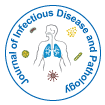Urbanization and Infectious Diseases Challenges and Solutions
Received Date: Jan 08, 2024 / Accepted Date: Jan 31, 2024 / Published Date: Feb 02, 2024
Abstract
Urbanization is a global phenomenon that presents both opportunities and challenges for public health, particularly in the context of infectious diseases. As populations migrate to urban centers, rapid urbanization can exacerbate the spread and transmission of infectious diseases due to factors such as overcrowding, inadequate sanitation, and limited access to healthcare services. This paper examines the challenges posed by urbanization in the context of infectious diseases and explores potential solutions to mitigate these challenges.
Key challenges include the heightened risk of disease transmission in densely populated urban areas, the emergence of urban-specific infectious diseases, and disparities in healthcare access and outcomes among urban populations. Rapid urbanization also exacerbates environmental degradation, which can contribute to the proliferation of vector-borne diseases such as malaria, dengue fever, and Zika virus.
To address these challenges, integrated approaches are needed that combine urban planning, public health interventions, and community engagement. Strategies include improving access to clean water and sanitation infrastructure, implementing vector control measures, enhancing disease surveillance and outbreak response capabilities, and promoting health equity through universal healthcare coverage and targeted interventions for vulnerable urban populations.
Furthermore, leveraging technology and innovation, such as mobile health solutions, digital surveillance systems, and predictive analytics, can enhance disease detection, monitoring, and response in urban settings. Community participation and partnerships between governments, civil society, academia, and the private sector are essential for implementing effective interventions and fostering resilience to infectious diseases in rapidly urbanizing areas.
In conclusion, urbanization presents complex challenges for infectious disease control, but also provides opportunities for innovative solutions to improve public health outcomes. By adopting a multidisciplinary and collaborative approach, policymakers and public health professionals can address the unique health needs of urban populations and create sustainable, healthy cities for all.
Citation: Xue X (2024) Urbanization and Infectious Diseases Challenges andSolutions. J Infect Pathol, 7: 224.
Copyright: © 2024 Xue X. This is an open-access article distributed under theterms of the Creative Commons Attribution License, which permits unrestricteduse, distribution, and reproduction in any medium, provided the original author andsource are credited.
Share This Article
Recommended Journals
Open Access Journals
Article Usage
- Total views: 593
- [From(publication date): 0-2024 - Apr 16, 2025]
- Breakdown by view type
- HTML page views: 395
- PDF downloads: 198
